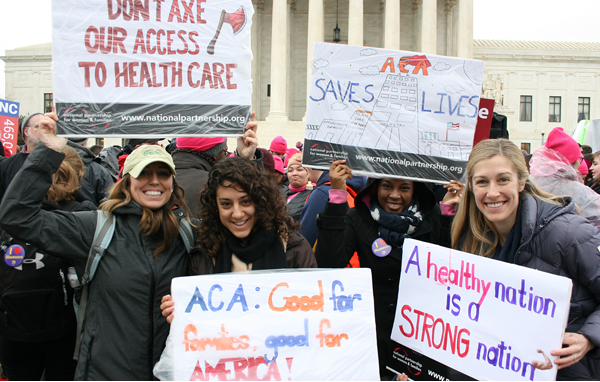By Mark Rosenberg, M.D.
While most of us have resolved in the New Year to lose weight, exercise more, and promote peace on earth, the Republican majority in the 114th Congress has resolved to try to repeal the Affordable Care Act (ACA, or “Obamacare”) for the 50th time. Not terribly surprising or even very original. What is original is what Sen. John Barrasso (R-WY), Chair of the Senate Policy Committee, said on Meet the Press recently—that Republicans were trying to build consensus around one plan to replace Obamacare. After five years of attempts to repeal without offering a constructive replacement, the Republicans may actually come up with an alternative? Given the success of the ACA in lowering the rate of uninsured to under 13 percent (according to Gallup, a more than four percent drop since enactment) and thereby providing needed affordable health care to millions, I do not recommend you hold your breath waiting for an alternative that would actually pass Congress.
What the Republican Congress does plan to pass this session includes the following changes to the Affordable Care Act:
1. With the support of a number of Democrats, repeal the medical devices tax that is expected to generate about $30 billion over the next 10 years.
2. Revise the ACA’s definition of full-time employment from 30 hours per week to 40 hours per week. This measure already has passed the House.
3. Abolish the Independent Payment Advisory Board, whose mission is to recommend savings in Medicare without affecting coverage or quality of care. This is the entity that opponents of the ACA wrongly labeled a “death panel.” Note that the Board’s recommendations are already subject to Congress’ overruling them by a supermajority vote.
4. Abolish the Patient Centered Outcomes Effectiveness Institute, which examines disease treatment regimens for results and recommends effective treatments to medical providers.
Since President Obama holds a veto pen, the only way these proposals could become law is if enough Democrats vote with Republicans to override the veto. This appears highly unlikely, except perhaps in the case of repeal of the medical devices tax.
However, there are two other significant threats to the ongoing viability of the Affordable Care Act: the pending lawsuit, King v. Burwell [Secretary of Health and Human Services], and the number of states with Republican governors and Republican control of the legislature. Relying on some unartfully drafted legislative language, plaintiffs in the Burwell case contend that unless a state actually operates a Marketplace website of its own, the ACA doesn’t allow the federal government to provide financial assistance to citizens of that state who purchase health insurance on that exchange. If the Supreme Court upholds the plaintiffs’ case in court, low- and middle-income citizens of any state that opted to use the Federal exchange would lose the tax credits that lower their premiums, as well as any cost sharing that lowers their deductibles and out-of-pocket maximums. Bottom line: millions of citizens no longer would be able to afford health insurance.
The second threat relates to those earning less than 137 percent of the federally-defined poverty level. Under the Affordable Care Act, these people are newly eligible for Medicaid, a state-federal partnership program; however, in the very 2013 decision that found the ACA to be constitutional, the Supreme Court also said that the federal government could not force a state to offer Medicaid to the newly-eligible poor, even if there was no cost to the state. After the states that had chosen to adopt this federally-funded Medicaid expansion last year showed such good results in lowering the number of uninsured, more states had been expected to opt into this federally-financed Medicaid expansion, but the election of more Republican governors and Republican legislatures may reduce the number of states willing to allow low-income families to obtain health care through Medicaid.
From all reports, as was the case last year, ACA enrollments this year will exceed expectations. Yet it appears that 2015 could be a crucial year for the continued success of this landmark legislation. Watch this space as Congress, the Supreme Court, and the states act.




